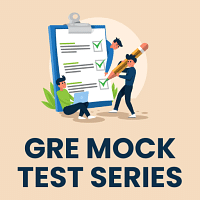GRE Exam > GRE Questions > Major philosophical (i)____ about morality, i...
Start Learning for Free
Major philosophical (i)____ about morality, identity and rationality, for example, can often be (ii)____ by thought experiments: short and simple expositions that pose an abstract and complex problem in a concrete manner with all the (iii)____ factors removed.
Q. Appropriate word for blank (i)
Q. Appropriate word for blank (i)
- a)certitudes
- b)dilemmas
- c)dogmas
Correct answer is option 'B'. Can you explain this answer?
| FREE This question is part of | Download PDF Attempt this Test |
Most Upvoted Answer
Major philosophical (i)____ about morality, identity and rationality, ...
Explanation:
The appropriate word for the blank (i) is "dilemmas". Here's why:
Thought Experiments in Philosophy:
- Thought experiments are hypothetical scenarios created by philosophers in order to explore and examine complex philosophical questions.
- These experiments often involve abstract and complex problems that are presented in a concrete and relatable manner, allowing individuals to engage in deeper reflection and analysis.
- Thought experiments can provide insights into various philosophical topics such as morality, identity, and rationality.
Dilemmas in Philosophy:
- Dilemmas are situations that require a choice between two or more equally undesirable options.
- In the context of philosophy, dilemmas often emerge when confronted with conflicting moral principles or ethical considerations.
- These dilemmas can be used to explore and analyze various moral theories and principles.
Relation between Thought Experiments and Dilemmas:
- Thought experiments in philosophy often present abstract and complex problems that involve dilemmas.
- By removing specific contextual factors, thought experiments strip down the situation to its essential components, allowing individuals to focus on the underlying moral, identity, or rationality dilemmas.
Example:
- One famous thought experiment is the Trolley Problem, which presents a dilemma involving the choice between actively causing harm to one person or allowing harm to come to multiple people.
- By removing specific details such as the identities of the individuals involved or the context of the situation, the Trolley Problem becomes a pure moral dilemma that can be analyzed and debated from various ethical perspectives.
Conclusion:
- Thought experiments serve as powerful tools in philosophy to explore complex concepts such as morality, identity, and rationality.
- By presenting abstract problems in a concrete manner and removing extraneous factors, thought experiments expose the underlying dilemmas and allow for deeper philosophical analysis.
The appropriate word for the blank (i) is "dilemmas". Here's why:
Thought Experiments in Philosophy:
- Thought experiments are hypothetical scenarios created by philosophers in order to explore and examine complex philosophical questions.
- These experiments often involve abstract and complex problems that are presented in a concrete and relatable manner, allowing individuals to engage in deeper reflection and analysis.
- Thought experiments can provide insights into various philosophical topics such as morality, identity, and rationality.
Dilemmas in Philosophy:
- Dilemmas are situations that require a choice between two or more equally undesirable options.
- In the context of philosophy, dilemmas often emerge when confronted with conflicting moral principles or ethical considerations.
- These dilemmas can be used to explore and analyze various moral theories and principles.
Relation between Thought Experiments and Dilemmas:
- Thought experiments in philosophy often present abstract and complex problems that involve dilemmas.
- By removing specific contextual factors, thought experiments strip down the situation to its essential components, allowing individuals to focus on the underlying moral, identity, or rationality dilemmas.
Example:
- One famous thought experiment is the Trolley Problem, which presents a dilemma involving the choice between actively causing harm to one person or allowing harm to come to multiple people.
- By removing specific details such as the identities of the individuals involved or the context of the situation, the Trolley Problem becomes a pure moral dilemma that can be analyzed and debated from various ethical perspectives.
Conclusion:
- Thought experiments serve as powerful tools in philosophy to explore complex concepts such as morality, identity, and rationality.
- By presenting abstract problems in a concrete manner and removing extraneous factors, thought experiments expose the underlying dilemmas and allow for deeper philosophical analysis.
Attention GRE Students!
To make sure you are not studying endlessly, EduRev has designed GRE study material, with Structured Courses, Videos, & Test Series. Plus get personalized analysis, doubt solving and improvement plans to achieve a great score in GRE.

|
Explore Courses for GRE exam
|

|
Major philosophical (i)____ about morality, identity and rationality, for example, can often be (ii)____ by thought experiments: short and simple expositions that pose an abstract and complex problem in a concrete manner with all the (iii)____ factors removed.Q.Appropriate word for blank (i)a)certitudesb)dilemmasc)dogmasCorrect answer is option 'B'. Can you explain this answer?
Question Description
Major philosophical (i)____ about morality, identity and rationality, for example, can often be (ii)____ by thought experiments: short and simple expositions that pose an abstract and complex problem in a concrete manner with all the (iii)____ factors removed.Q.Appropriate word for blank (i)a)certitudesb)dilemmasc)dogmasCorrect answer is option 'B'. Can you explain this answer? for GRE 2024 is part of GRE preparation. The Question and answers have been prepared according to the GRE exam syllabus. Information about Major philosophical (i)____ about morality, identity and rationality, for example, can often be (ii)____ by thought experiments: short and simple expositions that pose an abstract and complex problem in a concrete manner with all the (iii)____ factors removed.Q.Appropriate word for blank (i)a)certitudesb)dilemmasc)dogmasCorrect answer is option 'B'. Can you explain this answer? covers all topics & solutions for GRE 2024 Exam. Find important definitions, questions, meanings, examples, exercises and tests below for Major philosophical (i)____ about morality, identity and rationality, for example, can often be (ii)____ by thought experiments: short and simple expositions that pose an abstract and complex problem in a concrete manner with all the (iii)____ factors removed.Q.Appropriate word for blank (i)a)certitudesb)dilemmasc)dogmasCorrect answer is option 'B'. Can you explain this answer?.
Major philosophical (i)____ about morality, identity and rationality, for example, can often be (ii)____ by thought experiments: short and simple expositions that pose an abstract and complex problem in a concrete manner with all the (iii)____ factors removed.Q.Appropriate word for blank (i)a)certitudesb)dilemmasc)dogmasCorrect answer is option 'B'. Can you explain this answer? for GRE 2024 is part of GRE preparation. The Question and answers have been prepared according to the GRE exam syllabus. Information about Major philosophical (i)____ about morality, identity and rationality, for example, can often be (ii)____ by thought experiments: short and simple expositions that pose an abstract and complex problem in a concrete manner with all the (iii)____ factors removed.Q.Appropriate word for blank (i)a)certitudesb)dilemmasc)dogmasCorrect answer is option 'B'. Can you explain this answer? covers all topics & solutions for GRE 2024 Exam. Find important definitions, questions, meanings, examples, exercises and tests below for Major philosophical (i)____ about morality, identity and rationality, for example, can often be (ii)____ by thought experiments: short and simple expositions that pose an abstract and complex problem in a concrete manner with all the (iii)____ factors removed.Q.Appropriate word for blank (i)a)certitudesb)dilemmasc)dogmasCorrect answer is option 'B'. Can you explain this answer?.
Solutions for Major philosophical (i)____ about morality, identity and rationality, for example, can often be (ii)____ by thought experiments: short and simple expositions that pose an abstract and complex problem in a concrete manner with all the (iii)____ factors removed.Q.Appropriate word for blank (i)a)certitudesb)dilemmasc)dogmasCorrect answer is option 'B'. Can you explain this answer? in English & in Hindi are available as part of our courses for GRE.
Download more important topics, notes, lectures and mock test series for GRE Exam by signing up for free.
Here you can find the meaning of Major philosophical (i)____ about morality, identity and rationality, for example, can often be (ii)____ by thought experiments: short and simple expositions that pose an abstract and complex problem in a concrete manner with all the (iii)____ factors removed.Q.Appropriate word for blank (i)a)certitudesb)dilemmasc)dogmasCorrect answer is option 'B'. Can you explain this answer? defined & explained in the simplest way possible. Besides giving the explanation of
Major philosophical (i)____ about morality, identity and rationality, for example, can often be (ii)____ by thought experiments: short and simple expositions that pose an abstract and complex problem in a concrete manner with all the (iii)____ factors removed.Q.Appropriate word for blank (i)a)certitudesb)dilemmasc)dogmasCorrect answer is option 'B'. Can you explain this answer?, a detailed solution for Major philosophical (i)____ about morality, identity and rationality, for example, can often be (ii)____ by thought experiments: short and simple expositions that pose an abstract and complex problem in a concrete manner with all the (iii)____ factors removed.Q.Appropriate word for blank (i)a)certitudesb)dilemmasc)dogmasCorrect answer is option 'B'. Can you explain this answer? has been provided alongside types of Major philosophical (i)____ about morality, identity and rationality, for example, can often be (ii)____ by thought experiments: short and simple expositions that pose an abstract and complex problem in a concrete manner with all the (iii)____ factors removed.Q.Appropriate word for blank (i)a)certitudesb)dilemmasc)dogmasCorrect answer is option 'B'. Can you explain this answer? theory, EduRev gives you an
ample number of questions to practice Major philosophical (i)____ about morality, identity and rationality, for example, can often be (ii)____ by thought experiments: short and simple expositions that pose an abstract and complex problem in a concrete manner with all the (iii)____ factors removed.Q.Appropriate word for blank (i)a)certitudesb)dilemmasc)dogmasCorrect answer is option 'B'. Can you explain this answer? tests, examples and also practice GRE tests.

|
Explore Courses for GRE exam
|

|
Suggested Free Tests
Signup for Free!
Signup to see your scores go up within 7 days! Learn & Practice with 1000+ FREE Notes, Videos & Tests.






















